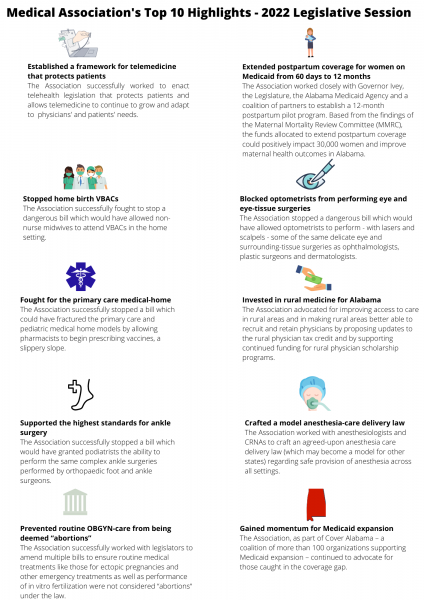Discussion with Decisionmakers: Gil Isbell
Rep. Isbell (R–Gadsden) is a member of the Alabama House of Representatives, serving the 28th district covering Etowah County. Born and raised in Etowah County, Rep. Isbell is supported by ALAPAC and is running for re-election to represent District 28. He works at Isbell Dental and served as President of Gadsden Kiwanis Club.
What first prompted you to consider running for office?
I wanted to give back to my community, county and state. In order to make a difference, you must get involved.
How does your background help serve you in the Legislature?
I have a diverse background in business from Airport Consulting, Real Estate, Retail, Recycling and more. Furthermore, I lived outside the state for 25 years and learned there are all types of people that make up our great nation.
What are some of your legislative priorities this term?
-Help find a suitable industrial occupant for the Goodyear facility.
-Help develop the Megasite and find manufacture(s) to locate at the site.
-Help make the GSCC Advanced Manufacturing and Workforce Development Center a reality. It will be a regional facility with dual enrollment, supported by all 3 school systems and will help support present and future training for many career tech jobs.
-Make the Southside Bridge the top infrastructure project and help secure funding.
-Help obtain a 3rd lane for Rainbow Drive/Hway 411 from Hway 77 to Lumley Road in Rainbow City.
-Help strengthen education and get more qualified teachers in place.
-Work with State leaders to further address Mental Health issues.
-Work on Parental Rights issues.
-Work on protecting individuals regarding Guardianship and Conservatorship.
-Work on reducing flagrant lawsuits.
-Give the Citizens the opportunity to vote for a lottery. Put the vote in the hands of the people.
-AND MUCH MORE!
What are some health-related issues important to your district and your constituents?
I am working with individuals and the Alabama State Lab to further new born testing. Also, I want to work on mental health issues.
What do you think people understand the least about our health care system?
I deal with insurance on a daily basis in my job at a dental office. Most people do not understand insurance coverage or what procedures are covered. Also, many people do not understand they need to see doctors on a routine basis.
If you could change anything about our state’s health care system, what would it be?
Develop a more consistent way to communicate with the public. I know the industry does a good job of educating the public, but I think it could be better.
How can the Medical Association – and physicians statewide – help you address Alabama’s health challenges?
As a legislator, we have to become experts in many fields (which is impossible). I would like for the Medical Association to continue to present and educate the legislature on issues that the medical association identifies as important to the citizens of our state.
What is the one thing you would like to say to physicians in your district?
Thank them for what you do. It is harder and harder to take care of patients because of the sheer numbers of patients that must be seen to make ends meet. Again, thank them for what they do.
Posted in: Advocacy
Leave a Comment (0) →





